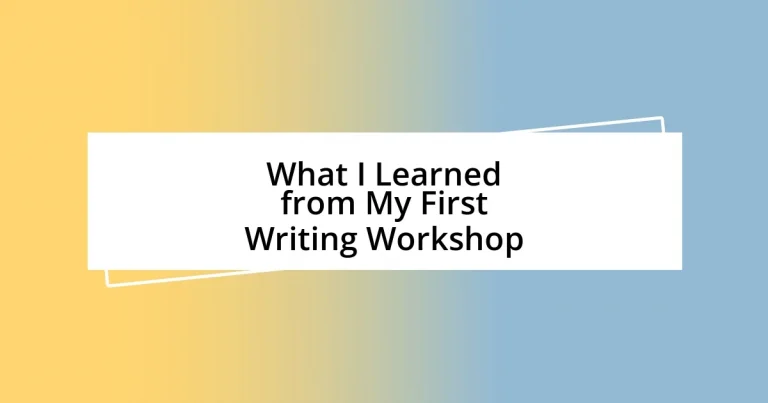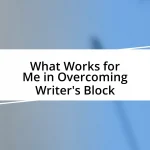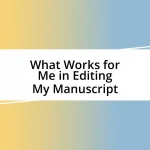Key takeaways:
- Writing workshops are valuable for sharing work, receiving constructive feedback, and building relationships with fellow writers, fostering both personal and communal growth.
- Receiving critiques can be transformative; they encourage writers to embrace vulnerability, explore deeper storytelling, and refine their writing skills.
- Establishing a supportive writing community enhances motivation and accountability, enriching both writing practices and personal connections among members.
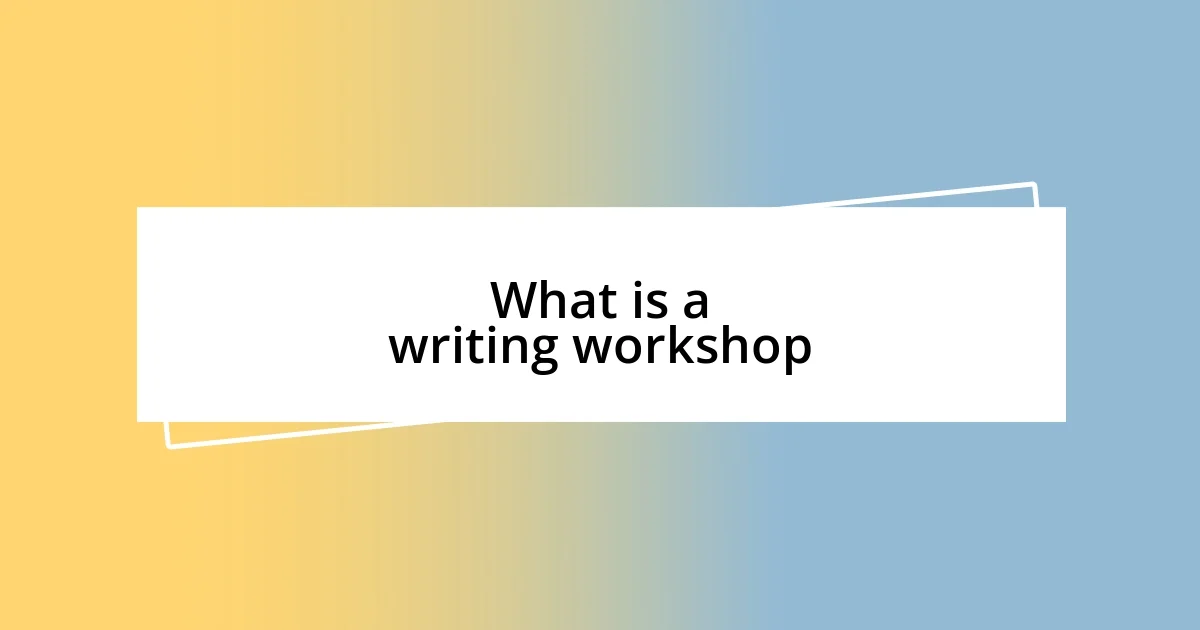
What is a writing workshop
A writing workshop is a creative space where aspiring writers come together to share their work and receive constructive feedback. I remember walking into my first workshop, feeling both excited and apprehensive, wondering if my writing would resonate with anyone. It’s amazing how vulnerability can unite individuals who are all navigating the same journey of self-expression.
Typically, these workshops involve a blend of writing exercises, peer critiques, and guided discussions. I recall vividly a moment when a fellow participant pointed out a unique perspective in my piece that I had overlooked. How often do we become so engrossed in our own narratives that we miss the beauty of collaboration? That’s the magic of a writing workshop; it pushes you to see your work through fresh eyes.
In essence, writing workshops foster a supportive environment where participants can grow and refine their craft. I’ve learned that it’s not just about getting feedback, but also about building relationships with other writers. Isn’t it comforting to know that others share the same hopes and insecurities? The connections we forge in these spaces can be just as valuable as the skills we develop.
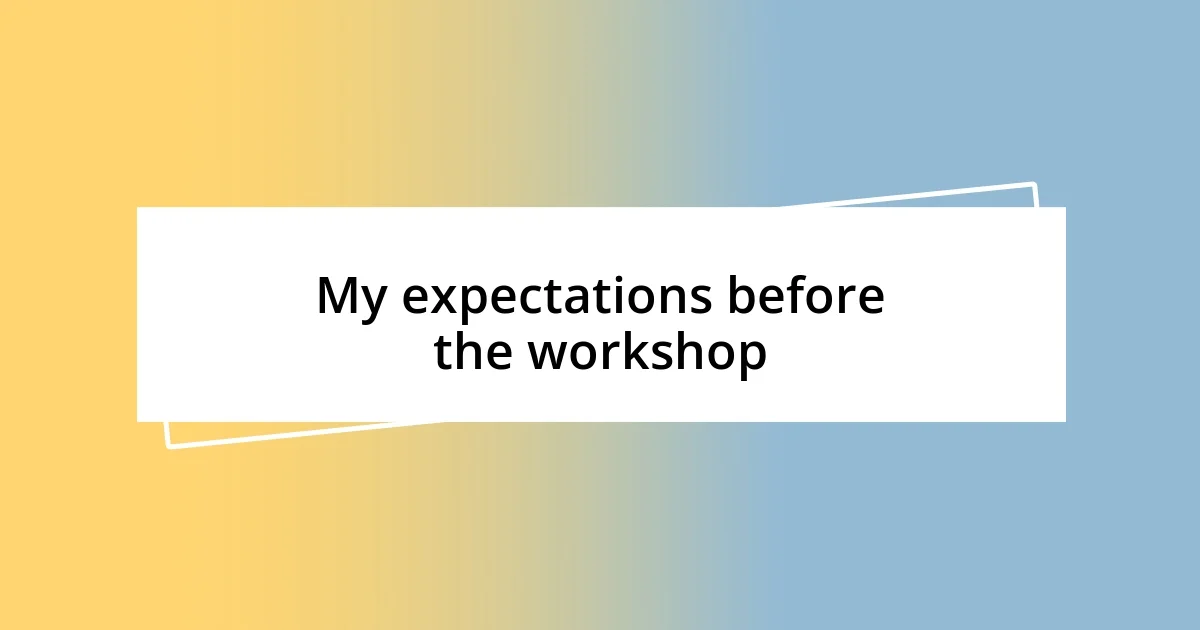
My expectations before the workshop
Before stepping into my first writing workshop, I had some pretty high expectations. I thought I’d be surrounded by seasoned writers, all of whom would effortlessly articulate their ideas, leaving me in awe. I still remember that nervous anticipation mixed with excitement, imagining myself learning from their expertise and gaining insights to elevate my writing.
However, I also pictured the potential for vulnerability. Would I receive honest feedback or be met with polite nods? The fear of my work being underappreciated lingered in my mind. I hoped for constructive criticism that would challenge me but was terrified that it would crush my spirit instead. I wanted to grow, but what if my raw emotions didn’t resonate with the others?
In reflecting on my expectations, I realized they were a blend of hope and fear, a duality I believe many writers experience. I wanted camaraderie among fellow creatives, where we could share our struggles and stories openly. This tug-of-war of emotions, wanting to connect yet fearing judgment, made the journey ahead both exciting and daunting.
| Expectation | Reality |
|---|---|
| High-caliber writers sharing insights | A diverse group of writers at different levels |
| Constructive criticism that spurs growth | Mixed feedback that varied in style and positivity |
| Close-knit community for support | Emerging friendships that developed over time |
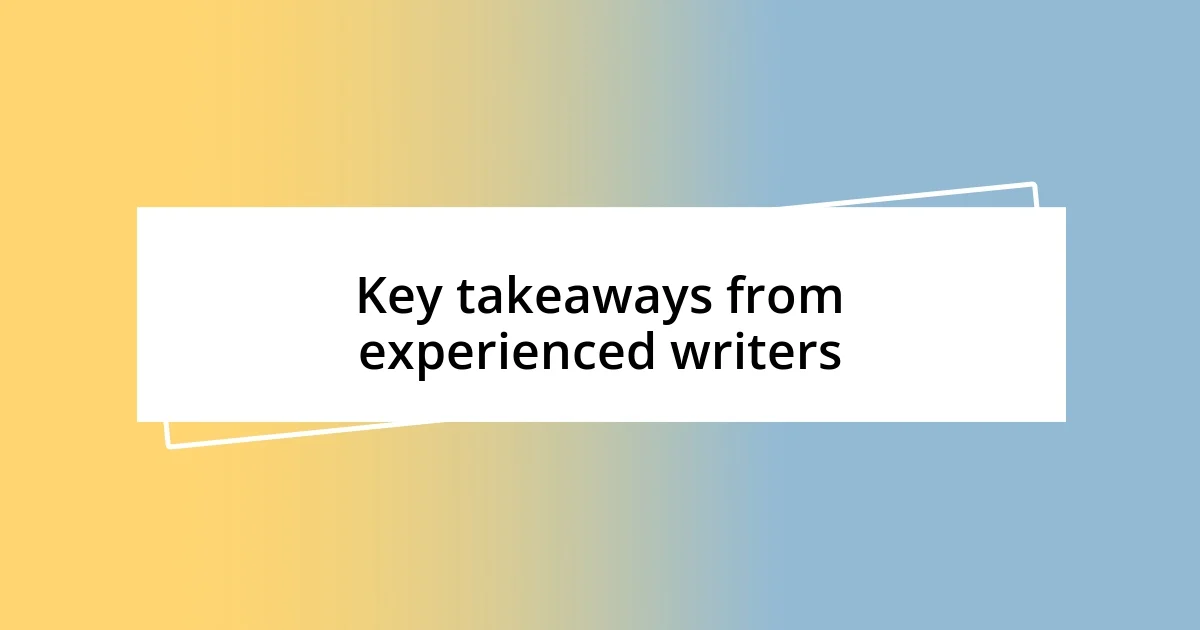
Key takeaways from experienced writers
As I sat in the workshop, absorbing the expertise of seasoned writers, I noticed a recurring theme: vulnerability is essential to growth. Experienced writers often echoed the importance of embracing the discomfort that comes with sharing your work. I remember one writer, with a calm demeanor, shared how a painful rejection led her to some of her best writing. Her story resonated deeply with me and inspired a sense of solidarity. It made me realize that every writer, regardless of experience, faces doubts.
Here’s what I gleaned from their wisdom:
- Honest Feedback is Gold: Seek out genuine critiques. They will push you to improve.
- Read Widely: Exposure to various writing styles can ignite creativity and inspire your unique voice.
- Write Daily: Consistency can transform a budding writer into a skilled storyteller.
- Connect with Others: Building relationships within the writing community can provide motivation and support.
- Don’t Fear Failure: Every mistake is an opportunity to learn and grow.
Digging deeper into these insights, I discovered the value of being open to experimentation. Another workshop participant shared how they explored poetry after a decade of writing fiction. Their courage to step outside their comfort zone encouraged me to try new genres as well. It was a comforting reminder that the journey of a writer is not linear; it’s full of twists and turns that can lead to unexpected discoveries.
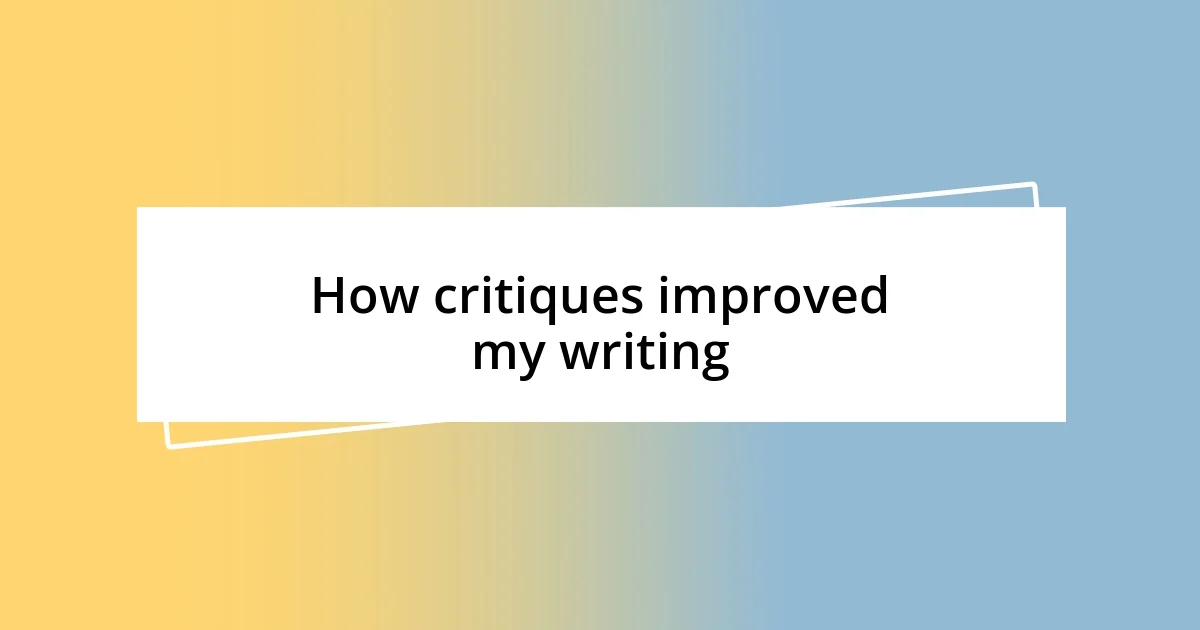
How critiques improved my writing
Receiving critiques in my first writing workshop was initially daunting, but I soon realized it was a game changer. I vividly remember the moment a fellow participant pointed out a repetitive phrase in my story. While my first instinct was to feel defensive, I quickly recognized that this feedback was a gift. It opened my eyes to habits in my writing I hadn’t noticed before and pushed me to think critically about my word choices. Isn’t it amazing how a few words from someone else can illuminate your blind spots?
As the workshop progressed, I found myself looking forward to the critiques instead of dreading them. One session, a mentor highlighted the emotional depth in a scene I thought was too understated. Her belief in that moment made me reconsider my approach to showing rather than telling. It’s fascinating how criticism doesn’t always tear down; it can also build you up, encouraging you to dig deeper into your characters’ motives and emotions. I began to ask myself: What truths am I shying away from?
By the end of the workshop, I had developed a thicker skin and an appreciation for diverse perspectives. I had become more receptive to feedback, understanding that every critique—whether harsh or gentle—had the potential to guide my growth. I recall the exhilaration of revising a piece based on insights from my peers; the draft transformed into something more vibrant and polished. That blend of community and constructive criticism was invaluable. Don’t you think every writer could benefit from such support?
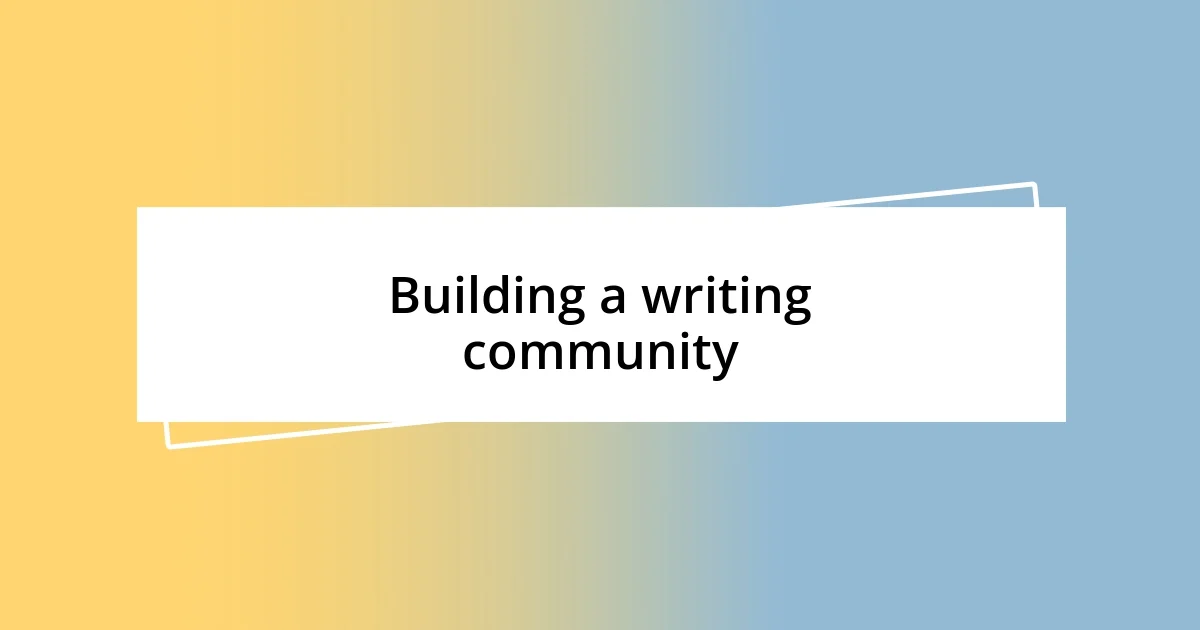
Building a writing community
Building a writing community is like discovering a second home. During the workshop, I started forming connections with fellow writers that felt authentic and meaningful. I still remember sipping coffee with a group after a session, sharing not just our struggles but also our victories. It was in those moments that I realized how important it is to surround yourself with people who understand the rollercoaster of writing. Have you ever felt that spark when you connect with like-minded individuals?
The power of community is transformative. I noticed how supportive comments ignited motivation in others, including myself. For instance, one participant shared a snippet of her work that she initially felt was unworthy of praise. Yet, the way we all rallied around her words, offering encouragement and suggestions, was electrifying. It made me think: how often do we underestimate the influence we can have on one another? Every piece shared felt like a celebration, an opportunity for us to learn from each other’s experiences.
Moreover, I found that the act of sharing not only nurtured my writing but also built a sense of accountability. We established a group chat that buzzed with discussions about deadlines, inspirations, and even our writing rituals. Knowing that others were cheering me on, and witnessing their progress, pushed me to write more regularly. Isn’t it incredible how a community can hold you accountable while lifting you up? Looking back, I can see how these connections not only shaped my writing but also enriched my life in unexpected ways.
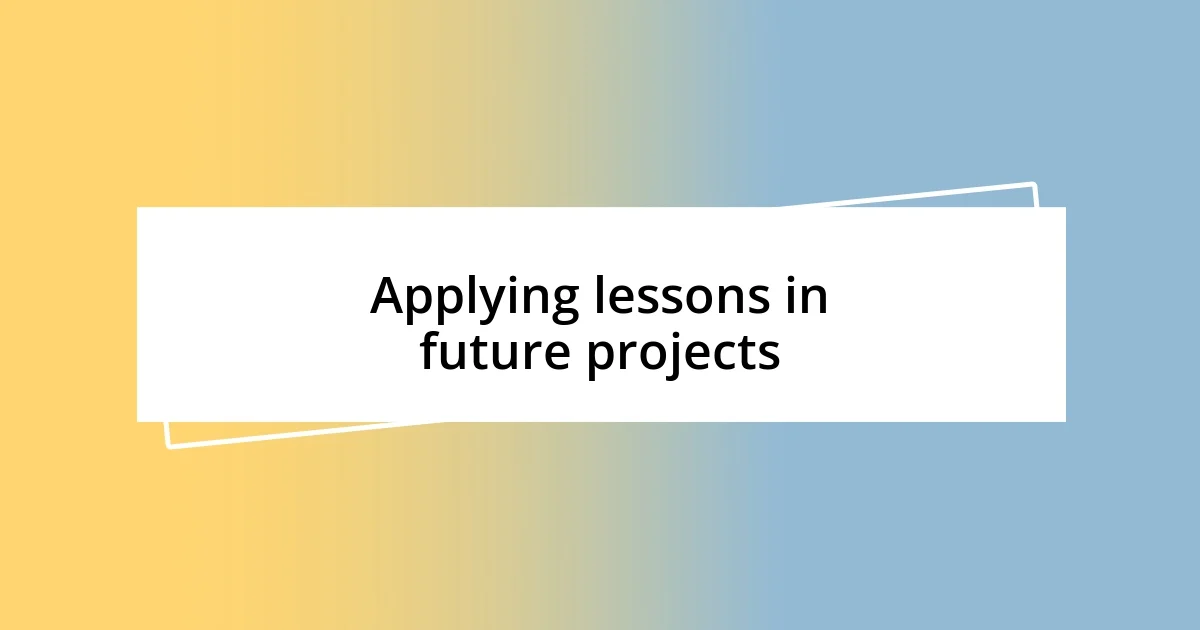
Applying lessons in future projects
As I dove into my future writing projects, I started consciously applying the lessons gleaned from the workshop critiques. One standout moment was when a participant encouraged me to explore deeper character motivations. This insight made me question: What drives my characters at their core? I now make it a point to infuse my stories with layers, asking myself not just what happens, but why it matters—both to the characters and to my readers.
I also learned the importance of brevity in writing. After receiving feedback on my tendency to overwrite, I took a closer look at my drafts. In my next project, I was deliberate about cutting unnecessary words. The difference was palpable. Each sentence became tighter and more impactful. Have you ever felt the weight lift off a piece when it’s streamlined? I found that my storytelling improved immensely when I focused on clarity instead of complexity.
Looking ahead, I’m excited to continue fostering my writing community. I’ve started a small group where we share our work and set up regular feedback sessions. The connection feels vibrant, much like my workshop experience. Each meeting reinvigorates my spirit. I often wonder: how can we create a space where everyone feels encouraged to explore their creativity? By nurturing this environment, I believe we can all grow as writers, learning from one another while celebrating our unique voices.












